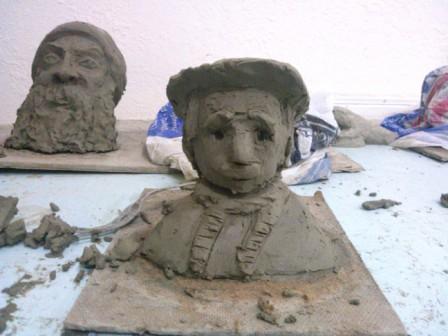Syrian-Armenian child: “In Syria I wanted to become a doctor, but now I have decided to become a painter…”

Soldier, church, tricolor…It turned out there is a complete story behind the themes of this image that has become ordinary for so many people.
During the “Nansen and Children” concert held at Komitas Chamber Music Hall, I met 12-year-old Hovhannes Levonian, who was making the finishing touches to his painting with small color solution.
“My Father”-this is the title of the boy’s painting which, as the boy explained, had a story behind it.
“I tried to portray my father and his friends. My father died during the war in Syria. That is why I decided to portray him in a military uniform. I really wanted to portray a church. I also painted an image of the Saint Sargis Church and the Armenian tricolor flag,” Hovhannes said.
Hovhannes, his brother, sister and mother moved to Armenia a year ago.
“We are here with my grandmother and paternal uncle. My maternal aunts are in Syria and Lebanon…Everything used to be good. We were all together. I tell them to come and stay with us, and they promise they will, but they haven’t come yet,” he said, smiling.
Hovhannes and her sister attend the Saryan Art School. Hovhannes also loves sculpting and especially likes to paint portraits.
“My very first painting was a painting of an old woman. My paternal uncle is a painter, and when he saw my painting, he liked it and said I should continue to paint. Then we came to Armenia, and now I work with clay,” Hovhannes says, showing a small clay sculpture. “I portrayed a fisher. I have the larger version of this sculpture, and now I wanted to show only the face.”
When I asked him if he had ever tried to paint a picture of his sister, he smiled and said:
“I painted a picture of her once, but it wasn’t nice. I don’t paint pictures of her anymore. One time I sculpted a girl and gave it to my sister as a gift, but my younger brother broke the head,” Hovhannes said, laughing.
Hovhannes also talked about what he has discovered in Armenia and started with the national dishes.
“One time, my paternal uncle gave me money and told me to go and buy khachapuri from the store. I had never eaten khachapuri in Syria, and I liked it a lot. I saw a green tomato in Armenia for the first time. We don’t have green tomatoes in Syria. I liked that a lot as well,” Hovhannes said.
As far as difficulties are concerned, Hovhannes talked about the language barrier first.
“Whenever I would speak “incorrectly” in the yard, the children would laugh at me. It wasn’t like that at school. The principal, teachers and children treated me well…I am good friends with David and have taught him almost all the letters of the Arabic language. The children at school would often ask me to teach them words in Arabic.”
As for friends in Syria, Hovhannes said he missed Vrej the most.
“Vrej is my closest friend. He and his family now live in Lebanon, but we often talk on the phone. I tell him to come to Armenia. I have promised him that when he comes, I will show him Republic Square. When I first came here, I also went there.”
Hovhannes doesn’t like to talk about the war. When asked what he saw, he kept silent, but later he told me to ask the questions that concerned me.
“I have seen people with snipers, and I was very afraid. I somehow ran and reached my house. A bomb even exploded on the top of our building once. They also attacked our yard once…
Now I miss my father and our home the most, but even if peace is established, I won’t go back. Armenia is close to my heart,” Hovhannes said.
Hovhannes said he has other dreams now.
“In Syria I wanted to become a doctor, but now I have decided to become a painter…”




 Արևելահայերեն
Արևելահայերեն Արևմտահայերեն
Արևմտահայերեն Русский
Русский






